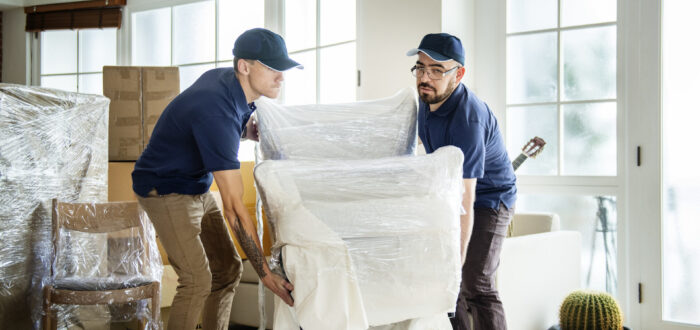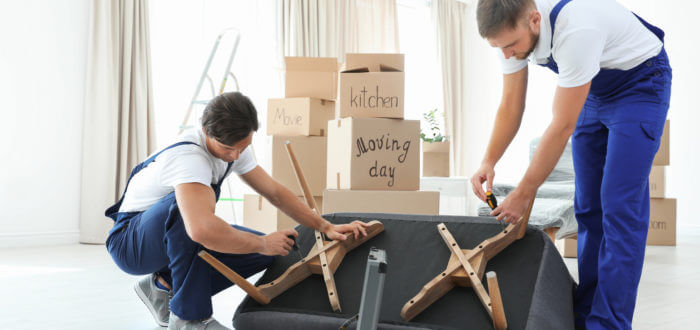

All the Things to Do After Moving – the Ultimate Checklist
Posted in Moving Essentials,Moving Tips & Tricks on January 29, 2021
Moving to a new state, city, and home is very stressful and overwhelming, but also exciting at the same time. Considering there are a lot of things to do after moving, you should make your checklist of things you need to do well ahead of your relocation. This way, your settling down will be much easier.
You are probably wondering why do I need a checklist when all I have to do is to unpack, right? But this is not the case since unpacking is not the only thing you have to do. Numerous other tasks have to be done as well, so keep reading to find out what they are.
What to Keep With You When Moving?
The answer to this question is your moving essentials and everything that you don’t plan on selling or donating. That means all functional furniture, clothes you’ll wear, books you still love, and so on.
This is a great opportunity to declutter, so don’t hesitate to get rid of the stuff you know you won’t be using in the future. Before relocation, it would be a good idea to make a moving binder, where you can keep all checklists. One of them could be the list of items you want to keep.
Things to Do Before Moving to a New Home
If you are wondering how much movers cost, you can always ask for a free estimate and compare several quotes from different companies. Hiring a reputable company when moving cross country is essential so do your best to find the right one. Be careful because there are a lot of moving scammers out there.
Check your company, read online reviews, and ensure a smooth relocation. Also, it will be good to have a smart moving budget not only to track how much money you spent on a cross-country moving company but how much money, in general, you spent during your move.
When it comes to packing, if you pack your items correctly, unpacking will go smoothly. You should have supplies like packing paper or bubble wrap and a good labeling system for packing. So if you sort your stuff and pack room by room, you will have fewer worries when unpacking starts.
But if you don’t know how to pack glasses for a move, pack fragile items, move a piano, or pack a moving truck, ask a professional for help.

Go to the Post Office to Change Your Address
This is one of the steps that are better to be done before you move to another address. You should inform all the right people that you plan to change or that you already changed your address.
Start with a post office and do this at least one week before your move. Then contact tax agencies, both federal and state agencies. You can easily change addresses online by filling out this IRS form, but for the state tax agency, you have to go to a state website and find directions there.
For gas and electricity, contact your companies and ask them to turn off your services in the old place the same day you move into your new one, and to start service at a new address the day after your relocation. This way, there will be no gap in your expenditure. Don’t forget about the phone, internet, and insurance agencies, they also have to be informed about your address change.
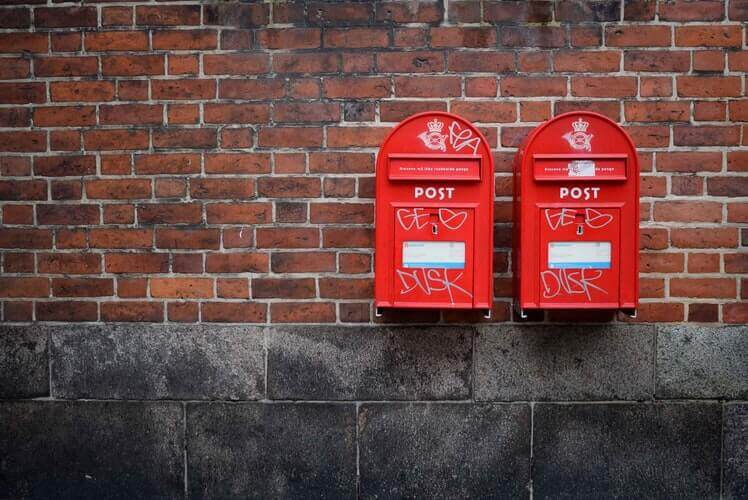
Things to Do After Moving – The Only After Moving Checklist You’ll Need
So you are on the way to your future home and wondering, what do I need to do after I move? It will be useful to arrange your arrival before the truck arrives. This way, you will have time to check everything in the new house and to be prepared for movers. If you got a job before moving, make sure to ask for a couple of days off so that you can settle. Keep reading to see what are the essential steps you should take after you relocate.
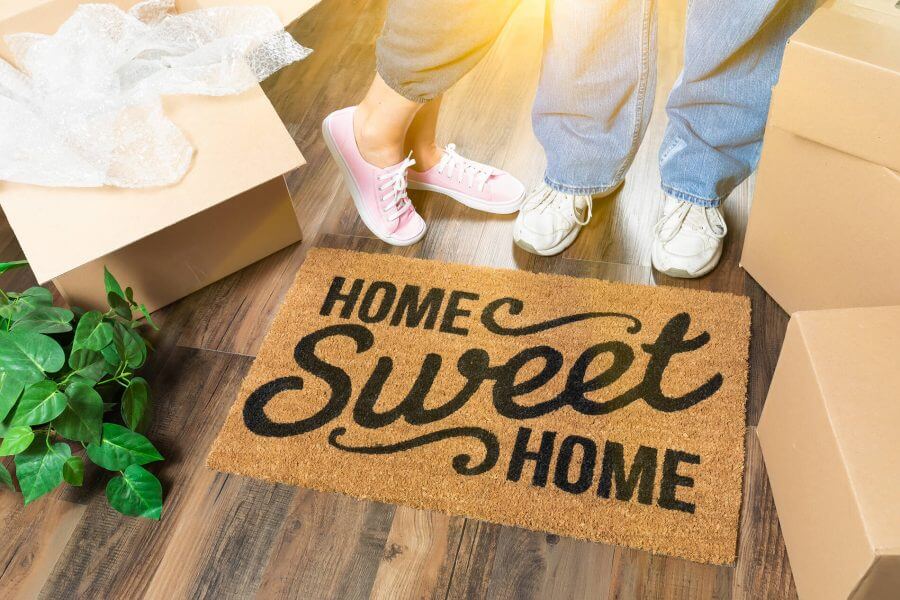
Step 1 of What to Do After Moving – Inspect Your New Home
Go to every room and do some inspection. Now when the house is empty, it is the perfect occasion to see if everything is in place. Maybe there are some cracks in the wall you didn’t see before, or the previous owner took the washing machine. You have to see if everything that you agreed in your contract is in place. And also, to see if everything is working properly – turn off the water on all the taps and ensure that there are no leaks.

Step 2 of Things to Do After You Move – Take Pictures While Everything Is Empty
This is an important step because your home will never be empty again. Take a picture of every room and every item and highlight if there is any problem. This way, you will have evidence that the damage was there before you move in. This is important if you don’t want to lose your deposit later on.

Step 3 on the List of Things to Do When You Move – Turn on Your Utilities
Check your utilities, electricity, water, gas, and internet to see if everything is on. Maybe some of these utilities are shut off. You should call the power company or gas provider to put your utilities on and to change them to your name. Connect your internet. This step is also important to do right away because you will need the internet to order food, check for a gas company number, or get in touch with your loved ones.
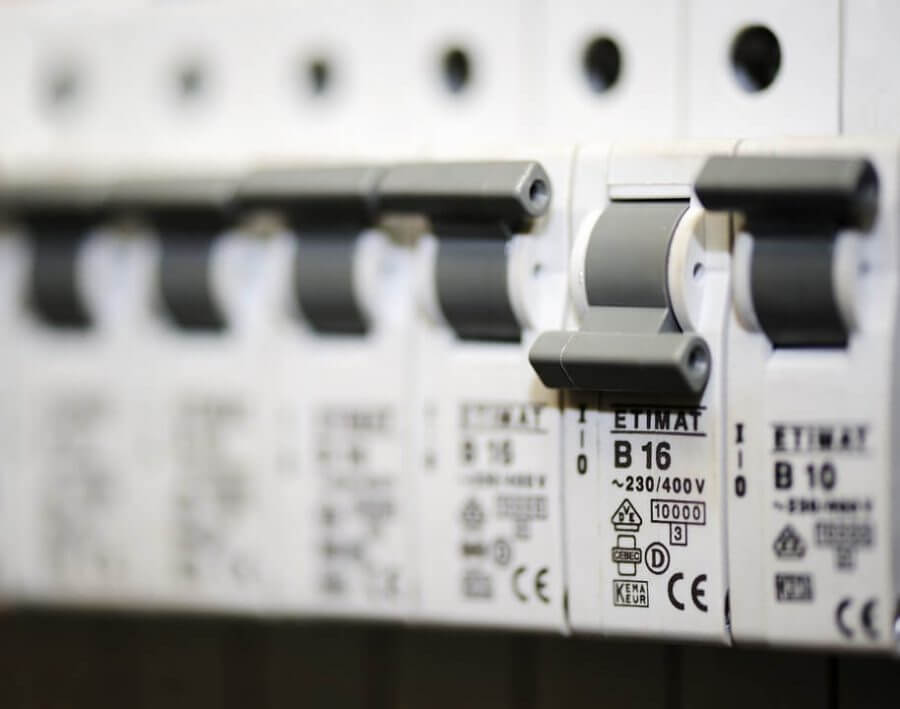
Step 4 of Things to Do After Moving – Clean Your New Home
If you are obsessed with cleaning, you don’t need us to tell you to clean your house. But this is something that is advisable to do. Clean especially rooms that you will use right away, like the bedroom, bathroom, and kitchen. It will be good to clean the floor before the furniture comes in.

Step 5 After Cross-Country Moving – Secure Your Home
So after you cleaned everything, now you should secure your home. You should check all smoke detectors and change the batteries in them. Change the door lock so you can be sure you and your family are the only ones to have them. Also if you don’t have an alarm system, now it will be a good time to call some company and arrange everything with them. Also, take a look at this video for more useful tips on what should be on your checklist.
Some Other Equally Important Things to Do After Moving Into a New House
If you give yourself enough time to do everything you need to do before movers from our Cross Country Movers HQ arrive, this part should be less stressful. When all major and crucial tasks are done, now you can begin unpacking with ease.
It Would Be the Best to Check Your Boxes First
If you still have your household inventory list, now you can use it again. First, check if all the boxes are there; it can happen that some get lost. If that’s the case, talk to your cross-country movers about this. Second, check the stuff inside to see if there are any damages. Cross Country Movers offers relocation insurance, so don’t worry too much if something got broken.
Start Unpacking After Moving Cross Country
If you hire a cross-country moving company for moving services and professional packing services, maybe this step will not be that hard. First, unpack the stuff you need to use immediately. Those would be kitchen essentials like glasses and plates; later, unpack your bedding and prepare your bedroom. Don’t wait until long-distance movers are gone to realize you don’t have a bed or don’t know how to put it together.
Get cross-country movers to do this for you, and don’t forget to tip those movers as well. You will not unpack everything in one day, so it is important to have at least one functional room where you can feel relaxed and at home. One of the things you can do is to set a time frame for each room. For example, the kitchen on Monday, the living room on Thursday, and alike.
Arrange Your Clothes
Arranging clothes can be painfully boring. But again, if you are organized well, it can be fun. First, start with the clothes you are wearing now, depending on the season. Put this thing on a hanger to be reachable easily.
Clothes that you won’t wear soon can stay in boxes if you don’t have space in your wardrobe, just put boxes on the side until you need them again. If you packed your clothes for moving properly, it would be easy to unpack. If you don’t have the space for all your stuff, we at Cross Country Movers offer free storage services for a month.
Order Food and Drink to Relax After Moving Across the Country
Unpacking can take a lot of time, and it is physically exhausting, so please, don’t forget to eat. Find the nearest food delivery and order some food. You can also order for everyone who worked with you and came to help. Also, get some beer or other beverages, and plenty of water, especially if you move in the summertime.

Tips on How to Start Feeling Like a Local After Relocating
Once you unpack everything, it is time to do other crucial things when adjusting to a new environment. If you are moving to another state alone, these tips are essential if you want to make friends.
Get to Know Your Neighbors
Relocating can be challenging. You have left behind everything familiar to you, including your close ones. If you have no one to talk to, meeting neighbors is a good start. But how to meet your new neighbors? Just knock on their door and introduce yourself. Later on, when you are all settled, you can make a dinner party and invite them over. This way, you will get to know them better or even make friends.
Explore Your New City
No matter if you are moving for love or for some other reason, you are probably feeling excited to see what is out there, what this city has to offer. For instance, cross-country moving with pets is always a plus because that’s the easiest way to meet other pet owners at the park. Or, if you don’t have a pet, take a ride on a bike. Take a ride around your neighborhood, meet your neighbors, see if there is a coffee shop you can visit daily. Go shopping and decorate your house the way you always wanted to.

Just One More Checklist Before You Settle
Create a list of all the fun and exciting things you want to see or do, or a list of items you want to buy for your home. Once all the stress is behind you, it is time to make it all worth it. So give yourself some time to do things that relax you and help you feel more like a local. Also, don’t forget to invite your friends and family to come and visit.
Frequently Asked Questions About Things to Do After Moving
What Are the First Things I Should Do After Moving Into a New Home?
The first things you should do after moving into a new home are to check for damage, unpack essential items, and set up utilities and services. Take a walkthrough of the house and note any damages or issues that need to be addressed. Unpack essential items such as toiletries, clothing, and bedding.
Set up utilities such as electricity, gas, water, internet, and cable services. Locate and test smoke detectors and carbon monoxide detectors. Additionally, update your mailing address and notify relevant parties, such as banks or government agencies, of your change of address.
How Can I Unpack and Organize My Belongings After Moving?
To unpack and organize your belongings after moving across the country, unpack essential items first, such as toiletries and clothing. Then, tackle one room at a time, starting with the most frequently used areas like the kitchen and bedroom. Use sturdy boxes or containers of various sizes and label them clearly.
Group similar items together and keep them in designated areas. Donate or discard any items that you no longer need or want. As you unpack, take the opportunity to deep clean and organize each room. Take breaks as needed, and don’t feel pressured to unpack everything at once.
What Are the Best Ways to Explore and Get To Know My New Neighborhood After Moving?
The best ways to explore and get to know your new neighborhood after moving are to take a walk or bike ride, visit local shops and restaurants, attend community events, and join local clubs or organizations.
Introduce yourself to your neighbors and ask for recommendations on places to visit or things to do. Look for community bulletin boards or social media groups to stay up-to-date on local happenings.
Take advantage of parks, trails, and other outdoor spaces to get a sense of the neighborhood’s character. Also, consider volunteering or getting involved in community service projects to meet new people and contribute to your new community.
How Can I Meet New People and Make Friends After Moving?
To meet new people and make friends after moving, join clubs, groups, or organizations that align with your interests, attend local events, volunteer for community service, take classes or workshops, and connect with neighbors or coworkers.
Consider using social media or online platforms to connect with people in your area. Don’t be afraid to initiate conversations or introduce yourself to others.
Be open to trying new things and stepping out of your comfort zone. Be patient and give yourself time to build relationships and establish a social network in your new community.
How Can I Get Involved in Community Activities and Events After Moving?
To get involved in community activities and events, check local community bulletin boards, social media groups, or websites to find upcoming events. Attend neighborhood association gatherings to connect with other residents and learn about ongoing projects.
Volunteer for local organizations or community service projects. Consider joining a local sports team or club, attending concerts or festivals, or participating in fitness classes or workshops. Be open-minded and willing to try new things to fully embrace your new community.
How Can I Update My Address and Contact Information After Moving?
To update your address and contact information after moving, start by filling out a change of address form with the post office. Notify your employer, banks, credit card companies, insurance providers, and other financial institutions of your new address.
Update your voter registration and driver’s license or state ID. Notify any subscription services, such as magazines or meal delivery services, of your new address. Give your new contact information to friends and family members. Finally, consider creating a forwarding address for any mail that may still be sent to your old address.
What Are the Best Ways to Familiarize Myself With the Local Amenities and Services After Moving?
The best ways to familiarize yourself with the local amenities and services are to explore the area on foot or by car, ask for recommendations from neighbors or coworkers, check online directories or review sites, and visit local businesses and establishments.
Look for community bulletin boards or social media groups to stay up-to-date on local events and happenings. Attend local festivals, farmers’ markets, and other events to get a sense of the community’s character. Try reaching out to local service providers, such as doctors or dentists, to establish relationships and ensure that your needs are met.
How Can I Find New Healthcare Providers and Services After Moving?
To find new healthcare providers and services, start by contacting your health insurance provider for a list of in-network providers in your area. Ask for recommendations from neighbors or coworkers, or search online directories or review sites.
Research providers’ credentials, experience, and patient reviews before scheduling appointments. Consider visiting a walk-in clinic or urgent care facility for immediate medical needs. Don’t hesitate to ask questions and communicate openly with your providers to ensure that you receive the best possible care.
What Are Some Fun and Unique Activities or Attractions to Check Out in My New City After Moving?
Some fun and unique activities or attractions to check out in a new city include visiting local museums, art galleries, or historical landmarks, exploring parks or nature reserves, attending concerts or theater performances, trying new restaurants or cuisines, and participating in local festivals or events. Take a walking tour or guided tour of the city to learn more about its history and culture. Check online directories or social media groups for other unique and interesting activities in your area.
How Can I Join Local Clubs or Organizations After Moving?
Start by researching groups that align with your interests or hobbies. Look for community bulletin boards, social media groups, or online directories to find information about local clubs and organizations.
Attend meetings or events to get a sense of the group’s activities and members. Introduce yourself and ask questions to learn more about the organization. Be open to trying new things and meeting new people. Commit to attending regular meetings or events to build relationships and get involved in the group’s activities.
How Can I Find New Restaurants, Cafes, and Bars in My New City After Moving?
Ask for recommendations from neighbors, coworkers, or online review sites. Check online directories or social media groups for local restaurant guides or food bloggers. Look for popular dining areas or neighborhoods and explore the area on foot to discover new places. Attend local food festivals or events to sample a variety of cuisines. Additionally, try new cuisines or dishes to expand your palate and discover new favorite spots.
How Can I Get Involved in Outdoor Activities and Explore the Natural Surroundings After Moving?
To get involved in outdoor activities and explore the natural surroundings, research local parks, trails, and nature reserves. Look for local outdoor activity groups or clubs, such as hiking or biking clubs.
Attend outdoor festivals or events to learn about outdoor recreation opportunities in your area. Consider taking classes or workshops in outdoor activities, such as kayaking or rock climbing. However, ensure you take proper safety precautions and follow guidelines when participating in outdoor activities.
How Can I Get Familiar With the Local Transportation System After Moving?
You should research public transportation options in your area, such as buses, trains, or subways. Look for online schedules or transit maps to plan your routes. Consider purchasing a transit pass to save money on fares. Download transportation apps or check online for real-time transit updates or alerts. Look for bike-sharing or car-sharing services in your area to explore alternative transportation options.
How Can I Keep Myself Motivated and Engaged During the Post-moving Adjustment Period?
Start by setting realistic goals and expectations for yourself. Stay connected with friends and family members for support. Make an effort to explore your new community and try new things. Join local clubs or organizations to meet new people and get involved in community activities. Take breaks as needed and practice self-care, such as getting enough sleep, exercise, and healthy eating. Finally, be patient with yourself and allow time for the adjustment process.
How Can I Maintain My Self-Care Routines and Mental Health After Moving?
To maintain your self-care routines and mental health after moving cross country, prioritize exercise, healthy eating, and getting enough sleep. Practice stress-reducing activities such as meditation or yoga. Stay connected with friends and family members for support.
Establish a routine that includes time for self-care activities. Look for local mental health services or support groups if needed. Avoid isolation by joining local clubs or organizations to meet new people and get involved in community activities.
